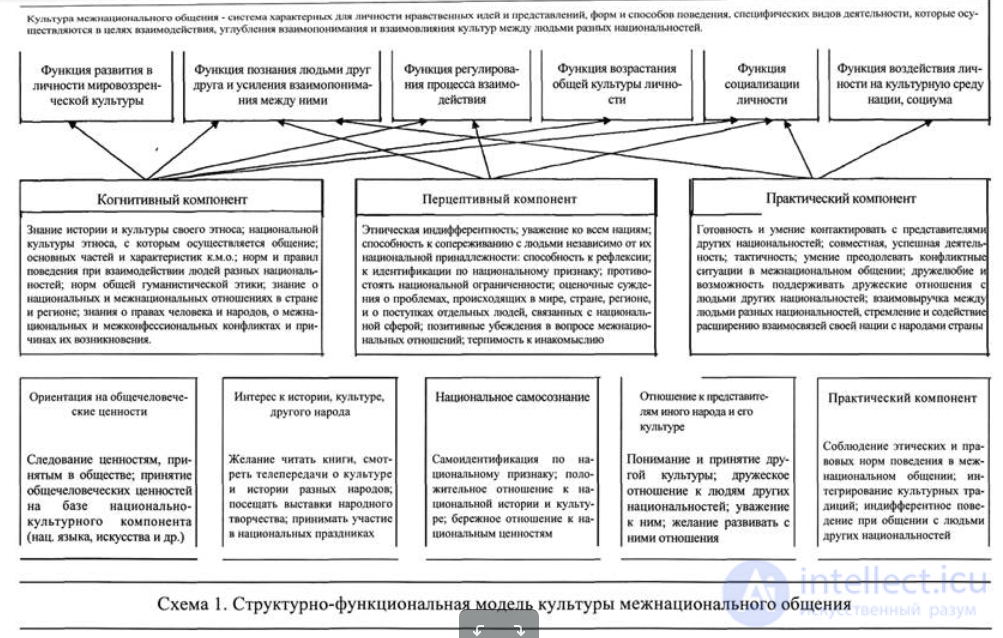Lecture
With the growth of national self-consciousness on the one hand and the growing manifestation of nationalism and chauvinism on the other hand, the problem of educating children of an emotionally positive attitude towards people of different nationalities and ethics between national communication becomes urgent. Raising a friendly attitude towards peers and people of different nationalities begins in early childhood.
In the first years of life, an attitude towards a person is available, but it is not tinged with knowledge of his national identity, that is, he does not take the factor of nationality into account, since he is not known to the child. Attitudes toward people of other nationalities begin to form in children from about 4 years old, when they learn about the multi-ethnic population of our planet. Older preschoolers, brought up in a multinational team, have a positive attitude towards representatives of different nations, which is most often manifested in interest in their life, culture, desire to be friends, share toys with them, even learn the language they speak. At the same time, direct or indirect manifestations of a different attitude have been observed: ridicule or vice versa, fear.
Children's tactlessness is also manifested when children try to “liken” their features (to make them look like) to a person of a different nationality, teasers, tactless questions to people of a different nationality, etc.
Children's spontaneity, limited life experience, and, above all, poorly developed humane relations, the lack of necessary ideas about the culture of communication - these are probably the main reasons for these negative manifestations. As a rule, they are inspired by adults, especially during acute conflicts in the sphere of ethnonational relations, therefore, the education of the ethics of interethnic communication of children with other nationalities should begin as early as preschool age.
A person is able to master the ethics of international communication from the first years of his life, and it is not reduced only to the forms of external behavior. This is, first of all, an attitude towards a person when children are not yet aware of the existence of different nationalities. Introduction to the ethno-national culture is the main way of educating children’s ethics of interethnic communication. This happens through the knowledge of folk wisdom, national traditions and customs, highly artistic works of talented national writers and poets, composers, artists, craftsmen. It is important to give correct guidelines to children in a social environment: a person is judged not by his nationality, but by what he is, by his deeds and actions.
The starting point of the education of ethics of interethnic communication should be the formation in children of an emotionally positive attitude to the national diversity of the population of our country, the diversity of human languages: "how good that we are many and we are all different."
The effectiveness of the education of ethics of international communication among preschoolers will depend on the integrated use of various methods and means.
The most important means is the communication of children of different nationalities, which can be organized in different conditions: in the kindergarten, outside the kindergarten with the participation of parents, the organization of special meetings.
A very effective tool is the organization of joint play activities of children of different nationalities. Of particular importance are plot-role and outdoor games. In them, the child sincerely expresses his feelings, thoughts, sympathies, friendships.
Oral folk art educates children a friendly attitude to different nationalities. A big role is played by fairy tales, where the culture and identity of the people are manifested. Tales are available to the understanding of children, they reveal the national peculiarities of life and life of the people, their cultural traditions. Reading fiction helps children learn more about the peculiarities of life and life of their peers. Holidays and entertainments in which all children participate are an effective means of fostering ethics of international communication.
Thus, in the process of cultivating sympathy and friendship between peers, respect for people of different nationalities, other important tasks of moral education are solved. Such work is aimed at the formation of the socio-moral qualities of the individual and, above all, humane, relating to the primordial universal human values.

Comments
To leave a comment
Pedagogy and didactics
Terms: Pedagogy and didactics